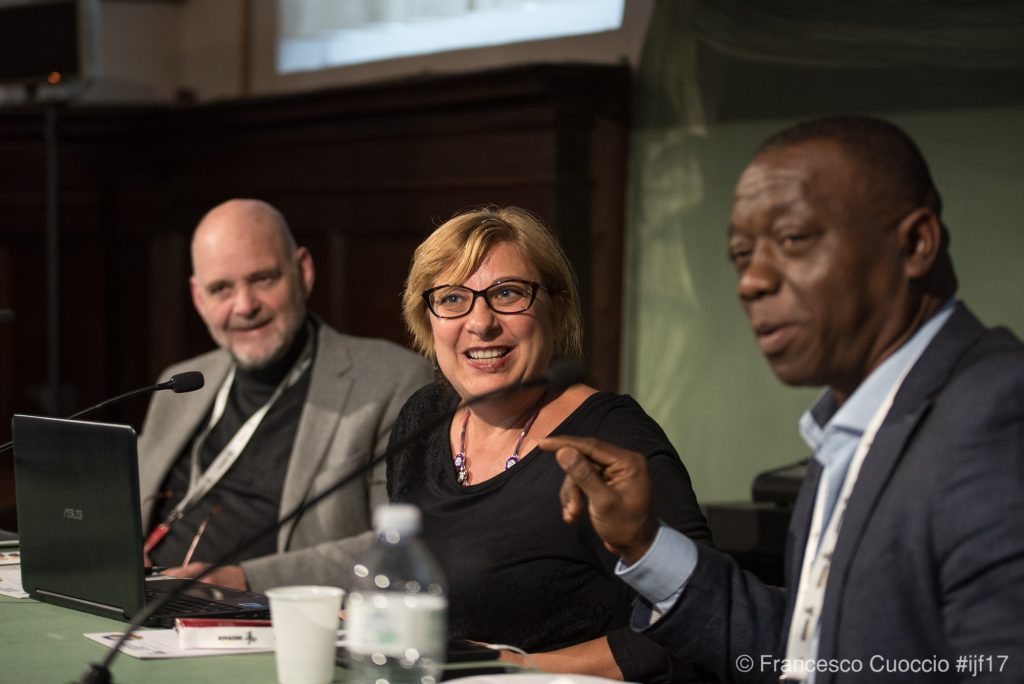How to investigate in Africa? How to face the differences? And, more importantly, should journalists be involved in the story more than they do at the moment? In an attempt to tackle these questions Ron McCullagh, BBC veteran and founder of Insight TWI; and Sorious Samura, Director of Insight TWI, talked about what is essential when it comes to conducting proper investigative journalism in the African continent.
Their Insight TWI produces films, documentaries and high-impact television programmes, both in terms of content and images. Thanks to their expertise, they create products addressing the most varies of topics, ranging from the Sierra Leone Civil War in the 1990s, to LGTB issues such as homosexuality in continental Africa, and the business structure behind the ‘blood diamonds’ trail.
McCullagh opened his keynote speech with a quick summary of his personal approach to reality during his ten years covering news in Africa as BBC reporter: “We did features on Africa as the normal white journalists (…) and then, this man [pointed to Samura] came here.” McCullagh had to cover the war in Sierra Leona, an experience like he ‘had never seen before.’
Samura started his speech asking how many members of the public enjoyed a cup of coffee or tea during the day, a question easily answered by the whole room. ‘But perhaps you have never noticed,’ what else is there in your ‘coffee or tea: can anybody guess?’ He explained that the whole process of production of seemingly incospicuous things such as drinks sometimes hide behind them a whole range of illegal activities varying from slavery, child labour, or the abuse of workers.
Samura thus tried to explain the huge problem that Western media has been facing for years: they have often failed in their coverage of African society, way of life and overall reality. Western journalists have been working in ‘parachute’ mode, trying to avoid close involvement in the stories they were trying to tell, with the people they were listening to, the characters and the main roles in African society.
‘They arrived, they asked them question, they took photographs (…),’ but the African people have always wanted to tell their own story, to be given their own voices and not to depend on western journalists. ‘Find the local journalist,’ suggested Samura. He believes that local journalists can offer you the view, the essential point of what their regions or countries really are. Because, as he affirmed, a five-day journey to war-torn areas is sometimes not enough to catch the whole reality of events.
“Until lions have their own historians, tales of the hunt will always glorify the hunters.” The quote from the Nigerian author Chinua Achebe seemed to perfectly sum up Samura’s ideas: Western journalists need to give their African colleagues the opportunity to tell their own stories, from their own, more experienced point of view.
Moderator Antonella Sinopoli proceeded then to question both speakers: “Isn’t there positive news in Africa?”
“Journalism is not only stories, it’s about ethics,” she affirmed as she proceeded to explain that in her opinion Western journalists fail to properly write about Africa because they avoid getting truly involved by what happens in the countries they should cover. They ‘take photos, record videos, and nothing more. With this idea, she asked Samura and McCullagh how many times the Insight TWI team goes back to the places they’ve reported about to check for further developments.
Samura firstly agreed with Sinopoli’s assessment about Western journalists,’ and explaining that that tendency is the main reason why their team usually goes back to those places without all the fanfare usually following their European or American counterparts. The reason behind Insight TWI’s approach to news coverage, as he spelled out, is rather straightforward: sometimes when government officials know that journalists are going to visit a particular area, they proceed to move everything to avoid journalists witnessing unsavoury situations, or poor living conditions.
